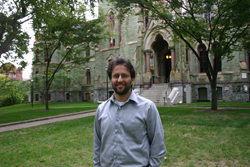The Building Blocks of Stress
Grad student Daniel Hackman uses neuroscientific techniques to study the relationship between childhood experiences and the body’s stress response.
Priya RatneshwarIn his previous career as a public health advocate, clinical psychology doctoral student Daniel Hackman worked with data that overwhelmingly linked differences in socioeconomic status to disparities in health and in cognitive abilities. “Poverty often appears to be a huge, intractable problem,” Hackman explains, “so I wanted to identify how specific mechanisms influence particular outcomes.”
 |
| A new study led by grad student Daniel Hackman shows that the basic emotional nurturing children receive from their parents when they are very young impacts their physiological stress response system later in life. |
At Penn Hackman is using neuroscientific techniques to shed light on how early childhood experiences in low-income populations can impact outcomes in health and cognitive abilities. Working with Martha Farah, Walter H. Annenberg Professor of Natural Sciences and Director of the Center for Cognitive Neuroscience, he led a recent study that shows that the basic emotional nurturing children receive from their parents when they are very young impacts their physiological stress response system later in life.
Hackman had the unique advantage of being able to work with data collected by collaborators at the Children’s Hospital of Philadelphia (CHOP). As part of an unrelated longitudinal study, CHOP researchers had conducted systematic home observations of a group of low-income children at the ages of four and eight. They noted nurturing behaviors, such as whether parents showed physical affection, used affectionate nicknames, and allowed children to express emotions freely, as well as aspects of the home environment, like the children’s access to books and exposure to a variety of experiences. Hackman was then able to study the physiological stress response of these same children between the ages of 15 and 18.
Other similar studies, Hackman explains, have depended on subjects recalling their early childhood experiences. “One of the problems with this,” he says, “is that memories of our childhood may be biased and not as accurate as direct observation.”
For the experiment, the teenagers were asked, in front of a video camera and peers, to give a short speech on the topic of why they were qualified for a summer job. They were also asked to complete a cognitive task in front of the same audience. Hackman periodically measured the release of the hormone cortisol, a critical component of the neuroendocrine stress response system, as the teens experienced these social stressors.
The study found strong and consistent evidence that emotional nurturance from parents—over all other factors—was involved in development of the neuroendocrine system’s response to social stress. Adolescents with lower levels of nurturance showed almost no physical stress response at all. Hackman’s next step is to explore if and how these differences translate into differences in neurocognitive performance.
“In the long term,” Hackman says, “I hope my research helps us understand how to prevent some of these disparities with more targeted and effective interventions and policies.”

